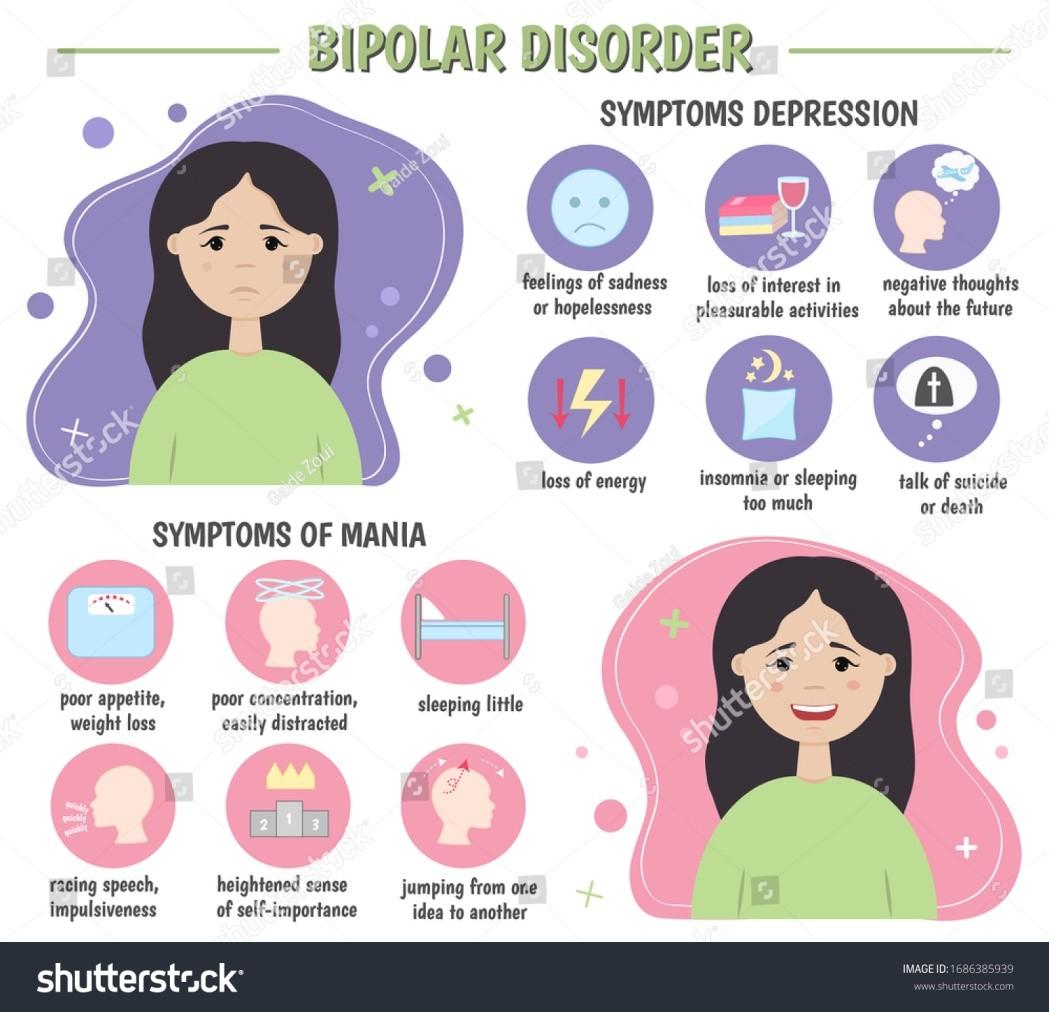BIPOLAR DISORDER TREATMENT IN DELHI









Bipolar disorder, also known as manic-depressive disorder, is a mental health condition characterized by extreme mood swings. The symptoms can vary in intensity and duration, and individuals may experience periods of elevated mood (mania or hypomania) and periods of depression. Here are the symptoms associated with bipolar disorder:
- Elevated or irritable mood: Feeling euphoric, excessively happy, or agitated.
- Increased energy: Having a high level of energy, feeling restless, or having racing thoughts.
- Decreased need for sleep: Feeling rested after very little sleep.
- Grandiose beliefs: Having an inflated sense of self-importance or unrealistic beliefs about one's abilities.
- Rapid speech: Talking quickly, jumping between topics, or having racing thoughts.
- Impulsivity: Engaging in reckless behaviors such as excessive spending, risky sexual encounters, or substance abuse.
- Poor judgment: Making impulsive decisions without considering the consequences.
- Increased goal-directed activity: Taking on multiple tasks or projects simultaneously.
- Distractibility: Being easily distracted or having difficulty maintaining focus.
- Agitation or irritability: Feeling restless or becoming easily annoyed or angered.
Manic Episode Symptoms:

- Persistent sadness: Feeling hopeless, empty, or experiencing a low mood for an extended period.
- Loss of interest: Losing interest or pleasure in activities once enjoyed.
- Changes in appetite: Significant weight loss or gain, or changes in appetite.
- Sleep disturbances: Insomnia or excessive sleep.
- Fatigue: Feeling tired, lacking energy, or experiencing a decrease in physical and mental activity.
- Feelings of guilt or worthlessness: Having excessive or inappropriate guilt, feeling worthless, or having low self-esteem.
- Difficulty concentrating: Having trouble focusing, making decisions, or remembering things.
- Psychomotor agitation or retardation: Restlessness or slowed movements and speech.
- Suicidal thoughts: Thinking about death or suicide, or engaging in self-harming behaviors.
It's important to note that the symptoms can vary from person to person and may also change over time.
If you or someone you know is experiencing symptoms suggestive of bipolar disorder, it is advisable to seek professional help from a mental health provider for an accurate diagnosis and appropriate treatment.


It's important to consult with a mental health professional for a personalized treatment plan. Here are some strategies that may help:
1. Medication: Bipolar disorder is often treated with mood stabilizers, antipsychotics, antidepressants, or a combination of these medications. It's crucial to work with a psychiatrist who can prescribe and adjust medications based on your specific needs.
2. Therapy: Different types of therapy can be beneficial for bipolar disorder. Cognitive-behavioral therapy (CBT) helps identify and change negative thought patterns and behaviors. Interpersonal and social rhythm therapy (IPSRT) focuses on stabilizing daily routines and managing relationships. Family-focused therapy involves family members in the treatment process.
3. Psychoeducation: Educating yourself and your loved ones about bipolar disorder can help you understand the condition better and develop effective coping strategies. Learn about triggers, symptoms, warning signs, and available treatments. This knowledge can empower you to manage the disorder more effectively.
4. Healthy lifestyle: Maintaining a balanced and healthy lifestyle is essential for managing bipolar disorder. Get regular exercise, eat a nutritious diet, and ensure sufficient sleep. Avoid alcohol and illicit drugs, as they can interfere with medication effectiveness and trigger mood episodes.
5. Stress management: Stress can exacerbate symptoms of bipolar disorder. Practice stress management techniques such as deep breathing exercises, meditation, mindfulness, or engaging in activities you enjoy. Find healthy outlets for stress, and consider setting boundaries to manage your workload and daily commitments.
6. Support network: Surround yourself with a supportive network of family and friends who understand and are empathetic toward your condition. Joining support groups or seeking peer support from others living with bipolar disorder can provide valuable insights and encouragement.
7. Self-care: Prioritize self-care activities that promote relaxation and well-being. Engage in activities that bring you joy, whether it's hobbies, creative pursuits, spending time in nature, or practicing mindfulness.
Remember, bipolar disorder treatment is a chronic condition, and managing it is an ongoing process. It's important to work closely with healthcare professionals to find the right combination of treatments that work for you.
Phone - +91 9811006930
Email - info@serenityclinic.care
Address -313, Sector-A, Pkt-C, Vasant Kunj Delhi –



